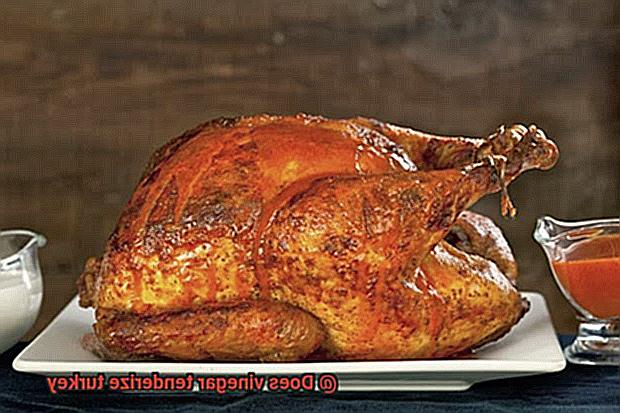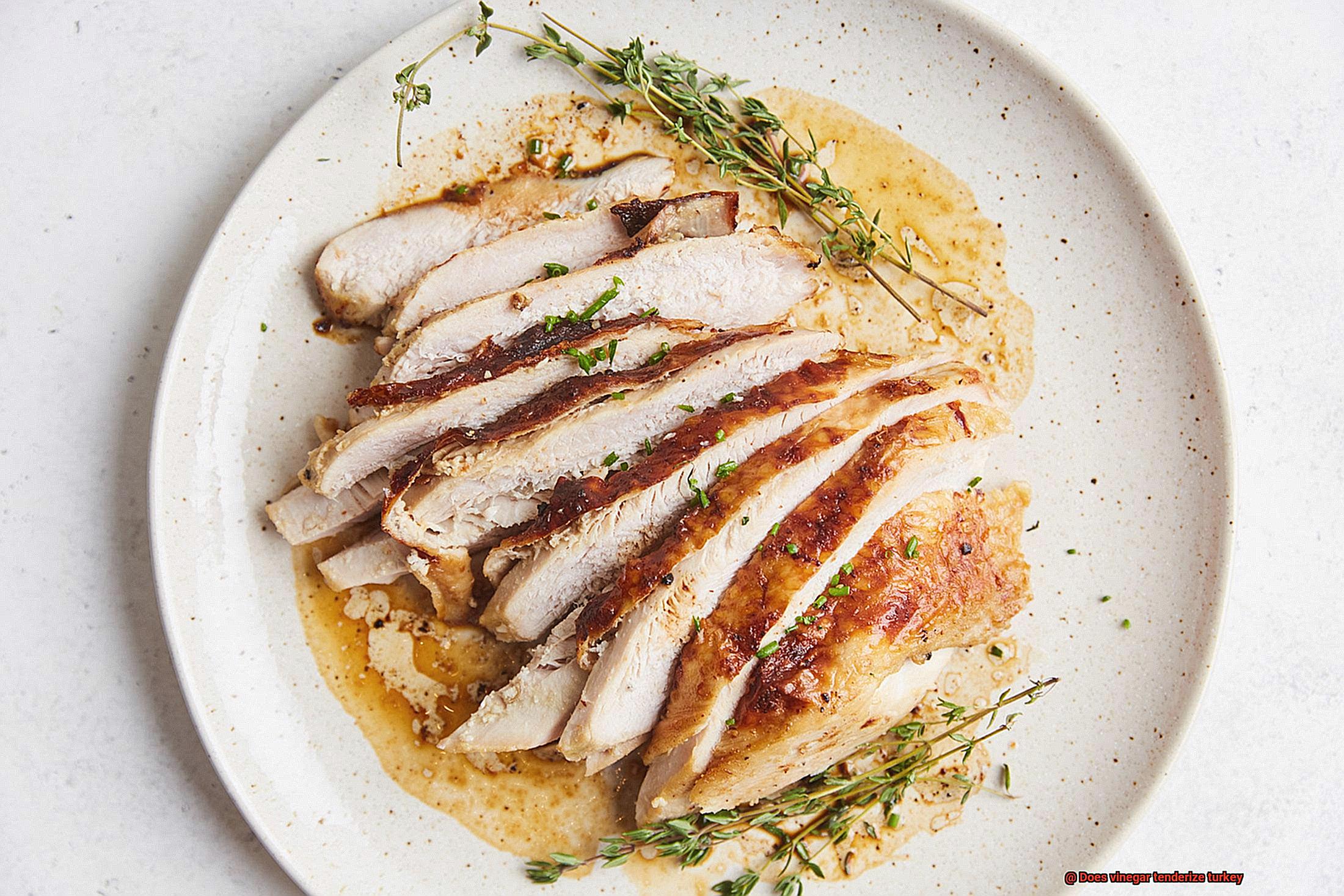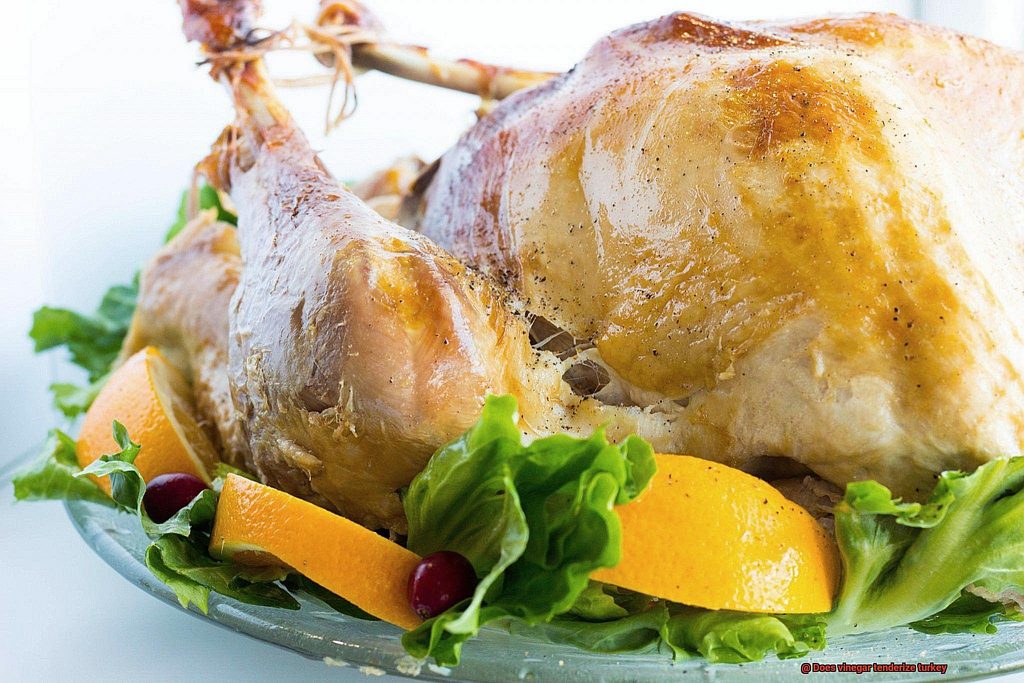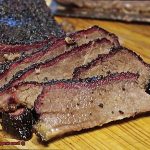Are you tired of serving up a dry, chewy turkey at Thanksgiving? Want to wow your guests with a juicy, succulent bird that’s bursting with flavor? If so, you may have heard that vinegar can be used as a turkey tenderizer. But does this kitchen hack actually work? And if it does, how does it work?
Let’s face it – not all of us are culinary geniuses who know how to cook the perfect turkey every time. Gravy can only do so much to mask an overcooked or tough bird. Nobody wants to gnaw on dry meat for hours. That’s where vinegar comes in.
For centuries, vinegar has been used as a meat tenderizer and remains a popular ingredient in many recipes today. But can it really tame the notoriously stubborn turkey? The answer is yes. Vinegar can help break down the fibers in turkey meat, resulting in a more tender and flavorful dish. But what’s the science behind this culinary magic?
In this blog post, we’ll delve into the nitty-gritty of vinegar’s tenderizing properties and explore different methods for using vinegar on your turkey – from brining to marinading. By the end of our journey, you’ll be armed with all the knowledge you need to whip up the most mouthwatering and tender turkey your loved ones have ever tasted.
Contents
The Benefits of Using Vinegar as a Tenderizer
This common household ingredient has been used for centuries as a meat tenderizer, and for good reason. The benefits of using vinegar as a tenderizer are numerous and diverse.
For one, vinegar is a powerful protein-breaker. When meat is cooked, the heat causes the proteins to denature and coagulate, resulting in tough and chewy meat. However, the acidity in vinegar can help break down these proteins, resulting in a more tender and juicy meat. This is especially important when it comes to turkey, which can often be dry and tough if not cooked properly.
But that’s not all – vinegar can also add flavor to your dish. The acidic taste of vinegar complements the natural flavors of the meat, resulting in a more delicious and enjoyable meal. You can also use vinegar as a marinade for your turkey, allowing it to soak up even more flavor and become even more tender. Experiment with different types of vinegar – from balsamic to apple cider – to find your perfect flavor combination.
Additionally, using vinegar as a tenderizer can reduce cooking time. When meat is tenderized with vinegar, it can cook faster because the fibers have been broken down. This is particularly useful when grilling turkey, as it can help prevent overcooking and dryness. Plus, it saves you precious time in the kitchen.

To properly use vinegar as a tenderizer for turkey, it’s important to mix it with other ingredients such as oil, herbs, and spices to create a marinade. This will not only help tenderize the meat but also add flavor. It’s also crucial to choose the right type of vinegar for your marinade, as different types may have varying levels of acidity.
Different Types of Vinegars to Consider
Tenderizing turkey with vinegar is a great way to make your meat more succulent and delicious. But with so many types of vinegar available, it can be overwhelming to choose the right one for your recipe. Here are some different types of vinegars to consider and their unique flavor profiles:
Apple Cider Vinegar
Apple cider vinegar has a slightly sweet taste that can help break down tough proteins in the meat. It’s also a great choice for marinades and dressings. This vinegar is perfect for those who prefer a milder taste.
White Wine Vinegar
White wine vinegar has a more subtle flavor than apple cider vinegar and can tenderize the meat without overwhelming it with too much acidity. It’s a great choice if you want to maintain the natural flavor of the turkey.
Balsamic Vinegar
Balsamic vinegar has a rich and complex flavor that pairs well with turkey. This dark, sweet vinegar is perfect for creating glazes and sauces that will add depth to your dish.
Red Wine Vinegar
Red wine vinegar has a bold flavor that can add a kick to your turkey. It’s great for marinades and dressings and can help break down tough proteins in the meat.

Rice Vinegar
Rice vinegar has a mild taste that won’t overpower the turkey, making it perfect for those who prefer a lighter touch. It’s also commonly used in Asian-inspired dishes.
Ultimately, the type of vinegar you choose will depend on your personal preferences and the specific recipe you’re using. It’s important to experiment with different types of vinegars to find the one that works best for your taste buds.
When using vinegar to tenderize your turkey, it’s important to mix it with other ingredients like oil, herbs, and spices to create a flavorful marinade. Different types of vinegars have varying levels of acidity, so it’s important to choose the right one for your recipe.
How to Use Vinegar as a Tenderizer for Turkey
If you’re looking for a way to make your turkey tender and juicy, vinegar may be the answer. This acidic liquid can help break down the tough fibers in meat, making it easier to chew and adding a tangy flavor. Here are five tips on how to use vinegar as a tenderizer for turkey:
Choose the Right Type of Vinegar
For tenderizing turkey, it’s recommended to use apple cider vinegar or white wine vinegar. These types of vinegar have a milder flavor that won’t overpower the taste of the bird. Other types of vinegar, such as balsamic or red wine vinegar, may be too strong and alter the taste of the meat.
Create a Marinade
To create a marinade, mix equal parts vinegar and oil, along with any other seasonings or spices you prefer. Place your turkey in a plastic bag or container and pour the marinade over the top, making sure that it is evenly coated. Allow the turkey to marinate in the refrigerator for at least 2 hours, or overnight for best results. The longer you marinate, the more tender and flavorful your turkey will be.
Baste While Cooking
During cooking, brush the vinegar mixture onto the surface of the turkey every 30 minutes or so. This will not only keep the meat moist and flavorful but will also help to tenderize it. Be careful not to add too much vinegar as it can make the meat tough.
Add Vinegar to Your Cooking Liquid
When roasting a turkey, add a cup of apple cider vinegar to the bottom of the roasting pan along with some water or stock. As the turkey cooks, it will absorb the vinegar-infused liquid, resulting in a more tender and flavorful bird.
Use Vinegar in Moderation
While vinegar can be an effective tenderizer for turkey, too much acidity can actually have the opposite effect and make the meat tough. Therefore, it’s important to use vinegar in moderation and follow proper techniques when using it as a tenderizer.
What Happens if You Use Too Much Vinegar?
First and foremost, overusing vinegar can drastically affect the taste of your turkey. While a small amount can add a tangy flavor, going overboard with it will result in an overpowering sour taste that can ruin the entire dish. No one wants a turkey that tastes like a jar of pickles, do they?
Not only does using too much vinegar harm the taste of your turkey, but it also impacts its texture. The protein in the meat breaks down when exposed to excessive vinegar, resulting in a mushy texture that is not appetizing at all. This can cause uneven cooking, with some parts being overcooked while others remaining undercooked.
So, how do we avoid these issues? The answer is simple: moderation is key. Depending on your recipe and cooking method, the quantity of vinegar required may differ. To ensure that you’re using just enough vinegar to tenderize your turkey without ruining it, it’s always best to follow a trusted recipe or seek advice from an experienced chef.
Tips for Making the Perfect Marinade with Vinegar
Marinating turkey with vinegar is a great way to add flavor and tenderness. However, it’s essential to use vinegar in moderation and in combination with other ingredients to achieve the desired results. Here are five tips for making the perfect marinade with vinegar for turkey:
Choose the Right Type of Vinegar
Choosing the right type of vinegar is crucial for achieving the desired result. White wine vinegar and apple cider vinegar are mild and won’t overpower the meat. Red wine vinegar can also be used, but it has a stronger flavor that may not suit everyone’s taste buds.
Consider Other Ingredients
Salt is essential for breaking down proteins in the meat and allowing flavors to penetrate. Sugar or honey can help balance out vinegar’s acidity and add sweetness. Herbs, spices, and garlic can also enhance your marinade’s taste.
Avoid Overdoing It
Using too much acid can make the meat tough instead of tender. It’s best to use no more than 1/4 cup of vinegar per pound of turkey.
Marinate for at Least a Few Hours
Marinating turkey for at least a few hours allows the flavors to develop, and the acid to work its magic on the meat. However, it’s best not to leave it in the marinade for too long. After 24 hours, the acid can start to break down the protein too much, making the meat mushy.
Balance Acid and Oil
Too much acid can toughen the meat, so it’s important to balance it with oil and other ingredients like herbs and spices. A good rule of thumb is to use a ratio of 3 parts oil to 1 part acid.
When marinating turkey with vinegar, keep in mind that it’s a lean meat that can dry out quickly if overcooked. A marinade with vinegar can help add moisture and flavor, but be careful not to marinate for too long or use too much acid. A few hours in the marinade should be sufficient for most cuts of turkey.
How Long Should You Marinate Your Turkey with Vinegar?
The acidity in vinegar can work wonders on your meat, breaking down proteins and infusing it with a delicious flavor. However, it’s important to remember that marinating for too long can have negative effects. To strike the perfect balance, I recommend not marinating your turkey with vinegar for more than 24 hours. This will give the vinegar enough time to tenderize the meat without making it too soft or mushy.
But choosing the right type of vinegar is also essential. Different vinegars have varying levels of acidity, and this can affect how long you should marinate your turkey. For instance, apple cider vinegar has a lower acidity level than white vinegar, and may require a shorter marination time. So choose your vinegar wisely.
When considering the size and cut of your turkey, keep in mind that smaller birds or cuts may only need a few hours of marination. Meanwhile, larger birds may require up to 24 hours to absorb all the flavors of the marinade.
Lastly, don’t forget about proper preparation before marinating. Removing excess fat and skin and puncturing the skin with a fork or knife will allow the marinade to penetrate deeper into the meat.
Other Ways to Tenderize Turkey Without Vinegar
Don’t worry, there are plenty of other methods that can achieve the same result without using vinegar.
One of the most popular options is marinating. A simple marinade made with oil, acid (like lemon juice or wine), and herbs and spices can do wonders for tenderizing your turkey. The acid helps break down the proteins in the meat, while the oil and seasonings add flavor and moisture. Allow your turkey to soak in the marinade for a few hours or overnight before cooking, and you’ll be rewarded with a tender and flavorful turkey.
Another option is to use a meat mallet or tenderizer. This tool physically breaks down the fibers in the meat, making it easier to chew and digest. While using a meat mallet is effective, be careful not to overdo it, or you may end up with thin and dry meat.
Brining is another great way to tenderize your turkey. Soaking your turkey in a saltwater solution for several hours before cooking helps break down proteins, resulting in a more tender and juicy texture. Experiment with adding herbs, spices, or other seasonings to the brine for extra flavor.
Slow cooking or braising can also do wonders for tenderizing your turkey. Cooking your turkey at a low temperature for an extended period of time allows the connective tissue in the meat to break down slowly, resulting in a tender and flavorful dish. This method is particularly effective for tougher cuts of meat like turkey legs or thighs.
ZCMzrcLyQHI” >
Conclusion
In conclusion, vinegar is a versatile and mouthwatering way to tenderize turkey. The acidity in vinegar helps break down the proteins in the meat, resulting in a more succulent and flavorful dish that will leave your taste buds singing with joy. But before you start pouring vinegar all over your turkey, it’s important to choose the right type of vinegar for your recipe and mix it with other ingredients like oil, herbs, and spices to create a marinade that will elevate the flavors of your dish.
When using vinegar as a tenderizer, moderation is key. Too much acid can make the meat tough and ruin its taste. But fear not. There are plenty of other ways to tenderize turkey if you’re not a fan of using vinegar or want to try something new. Marinating with oil, acid, herbs, and spices is an excellent option that adds flavor and moisture to the meat. Using a meat mallet or tenderizer physically breaks down the fibers in the meat for easier chewing. Brining in saltwater solution before cooking can also help break down proteins for a more tender texture. Slow cooking or braising at low temperatures is another effective method for tougher cuts of meat.
Proper preparation is crucial when it comes to achieving juicy and flavorful turkey every time. Removing excess fat and skin, puncturing the skin with a fork or knife before marinating or cooking will allow flavors to penetrate deeper into the meat. With these tips and tricks up your sleeve, you’ll be able to impress your guests with a deliciously tender turkey that they won’t soon forget.
In summary, whether you choose vinegar or one of the many other methods available for tenderizing turkey, taking care during preparation will ensure that your final product is nothing short of spectacular.






